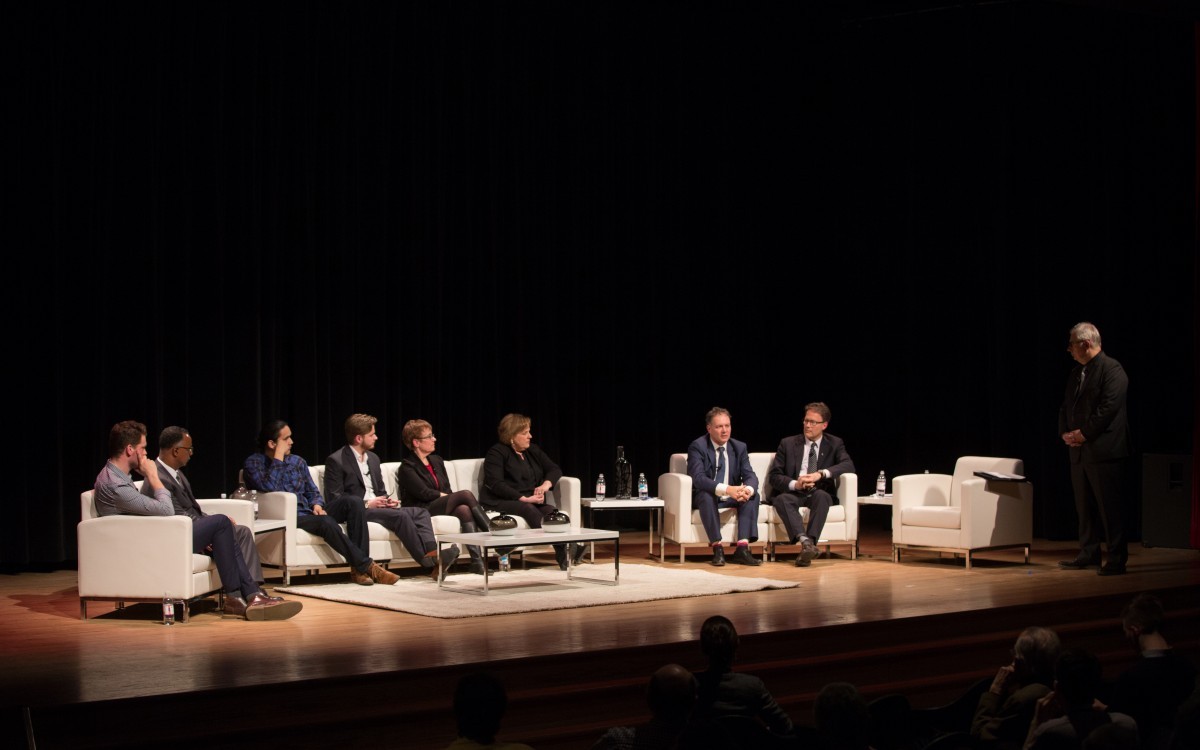
Visionary Conversations in the Community – What's the value of post-secondary education // From left to right: Michael Barkman, Gervan Fearon, Kevin Settee, Jeremiah Kopp, Annette Trimbee, Heather Tulk, Alex Usher, Paul Vogt, David Barnard
Reaching higher
Accessibility and evolution keys to post-secondary education
The value of education isn’t determined solely by economics. That was the consensus of the second Visionary Conversations in the Community event of the 2015/16 season.
With the largest panel in the series’ five-year history, and a topic that affects every corner of the province – the evening prompted a thought-provoking and engaging discussion with themes ranging from accessibility, to the role universities and colleges have on society, to the evolution of post-secondary education.
University of Manitoba President David Barnard introduced the topic – Has Manitoba put the right value on post-secondary education? – and the eight panelists to the near-capacity audience at the Winnipeg Art Gallery.
Alex Usher, president, Higher Education Strategy Associates was the first to speak. He pointed out that Manitoba is the only province that continually invests in post-secondary education at a level that’s higher than the rate of inflation. He also stated that Manitoba is the only province where students pay less in tuition when compared to subsidies provided by government.
Despite this, Michael Barkman, chairperson, Canadian Federation of Students (Manitoba), emphasized the necessity for affordability in order to make post-secondary accessible to as many people as possible. Barkman went further, saying the value of education plays a deeper, more critical role in society. This sentiment was echoed by every panelist with points that ranged from the impact post-secondary education has on personal finances to the development of the economy to the innovation that comes from higher learning.
Consensus among the panelists was also reached in stating a need for further evolution of the post-secondary system. Starting with the K-12 schools, it was agreed that more information could be provided to students who haven’t yet entered university or college. Schools, parents and peers play a significant role in guiding the academic paths that ultimately form careers. Students should be encouraged to explore what’s right for them and hopefully realize this before they’re well into a post-secondary program.
One way to do this is not to ask young children what they want to be when they grow up, rather ask them how they can change the world said Heather Tulk, chief customer officer, Manitoba Telecom Services. Instilling this kind of passion, from an early age, will help teach greater problem solving skills, flexibility and to be engaged citizens. This is what employers are ultimately looking for.
It was also pointed out that diversity of enrolment is very important to the future of post-secondary education. This can be developed by increasing affordability and by doing so classrooms become more diverse, which in turn allows for greater innovation. Kevin Settee, Local 8 representative for the Canadian Federation of Students (Manitoba) went further, saying all post-secondary institutions need to think about applying Indigenous aspects to academic programming. He received roaring applause for suggesting a greater cooperation between Indigenous and non-Indigenous teachings would ultimately lead to reconciliation, not just in colleges and universities, but in society as a whole.
Universities and colleges need to be permeable and understand what’s going on in the community said Annette Trimbee, president and vice-chancellor, University of Winnipeg. Trimbee added that universities have a reputation for being stuck in the past but things are changing and Manitoba is seen as revolutionary in this aspect. The Indigenous Education Blueprint for example shows the province is in the process of going forward.
A full recording of the event is below. The conversation can continue anytime on twitter at #umvisionary.
Mark your calendars: Visionary Conversations in the Community will be back May 18th, 2016 to discuss the topic: What more can Manitoba’s “most powerful” do to open the door to diversity?
Visit the website for more event details and updates.






